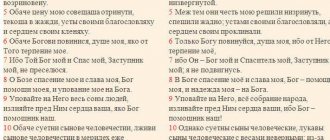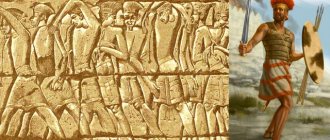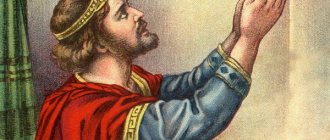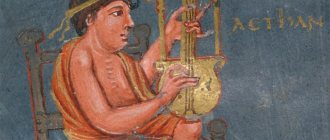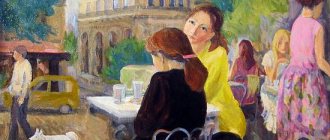Text of prayer Psalm 72
Although written in Hebrew, the chant has been translated into many other languages. In Russia, the most popular versions are considered to be Church Slavonic and Russian variations on prayer 72.
In Church Slavonic
In Russian
We read the Psalter. Psalm 72
Audio |
Conversation with Archpriest Alexy Ladygin about the Psalter.
Dear brothers and sisters, we continue to study the Psalter, and today we will talk about the 72nd psalm, which, like the others, has the inscription: psalm to Asaph, 72. Why specifically Asaph? Some say that at the beginning the psalm still has the following inscription: the songs of David, the son of Jesse, have become impoverished. Why have David's songs become scarce? Some believe that it was not the psalmist David who wrote further, but other authors of psalms. But you and I have said more than once that the entire Psalter was written by David - he did not always sing his psalms himself, but sometimes gave them to Asaph to sing, which is why the psalm had such an inscription. The nearest psalms that we will talk about (there are more than a dozen of them) were not sung by King David himself, which is why there is the following inscription: the songs of David, the son of Jesse, have become scarce. That is, it’s not that he didn’t write them, but he didn’t sing them, but gave them to Asaph to perform, who voiced David’s songs to the people. The psalm itself is amazing. It is dedicated to the invention and instruction that people often incorrectly think about the judgments of God, thinking that those who do not strive, do not believe in God, do not follow Him, live happily on this earth, and those who do the will of God and follow Lord, experience a lot of suffering in their lives. There is a certain untruth in this, as if God does not know what their neighbors, those who confess the Lord, need, that they even feel a certain mockery of themselves.
The psalmist destroys such thinking and says that a person’s thoughts must be correct. You cannot judge by some initial stages of human life without seeing a person’s entire life. The overall picture of ups, downs and punishments from the Lord can only be seen when you know a person’s whole life. And the rich becomes poor - wealth ends, passes from hand to hand: a person who lives for the purpose of wealth or the structure of his life, in the end, is broken on an invented stone, which does not become a solid foundation, and his life becomes terrible; everything else passes like a dream, very quickly and almost unreal. But the reality of life is different for every person.
The psalmist dedicates this psalm to people who experience cowardice, when they are visited by some kind of sorrow, difficulty, when a person begins to consider: “Look how others live...” - so that a person overcomes this cowardice in himself and never loses his trust in the Lord , but lived according to the will of God. And God will never forget His own. So that such a person remembers the words of the Lord: “Shall a woman forget her suckling child, lest she have compassion on the son of her womb? but even if she forgot, I will not forget you”...
“If the God of Israel is good with a right heart.” Those who are right in heart are those who devote their will to the will of God and never want everything in life to be arranged the way they want. These are the ones the Psalmist calls right in heart and says that if the Lord is good, then you should not have any doubts: live according to the will of God, and God will arrange everything in your life.
“For a little while my feet did not move; for a little while my feet did not shed.” Here again the Psalmist uses figurative language, saying that there should be no lameness in our lives, we should walk clearly with firm feet. As the prophet Elijah said: “How long will you limp on both knees?”, that is, how long will you allow evil thoughts that give rise to distrust of God? Only pure thoughts should be in our heads, and then everything will work out in our lives. We must always trust in the Lord, who cares for every person.
“Because I am jealous of the wicked, the world of sinners is in vain.” Indeed, a certain confusion occurs in a person when he sees how rich people live, who are not all believers. This psalm was written by the Psalmist, who prophesied how the people would be brought out of Babylonian captivity. When the people were in captivity, they saw how the owners lived and how the Jews lived, who had true worship of God, who lived in righteousness, and they thought: why are these people prospering, they have everything in abundance, and we, fulfilling the will of God and the commandments of God , we have such a hard life? But a hard life is not accidental - the Lord gives for sins the opportunity to correct them in this life through suffering, this is good and pleasant in the sight of our Savior God, Who wants all mankind to be saved and to come to the understanding of truth.
“For there is no joy in their death and no affirmation in their wound.” The psalmist reasons: look, they are not afraid of death, because they do not have sudden death from hard work, from the labors that they suffered, and from the wounds that were received from great labors. They are not afraid of death, they live normally, naturally, and death comes naturally to them. Therefore, without doing anything, they do not have such fear of death. But we live and fear death every day, because it comes from hard work and from the wounds that we receive every day, exposing ourselves to great danger.
“There is no point in human labor, and people do not suffer wounds” - they do not bear enormous labor and do not accept any wounds, nothing is imposed on them - they truly prosper. And we are very often tempted by this when we see that people do nothing special, do not receive any wounds, no illnesses from their labors: they easily and simply go to the office, receive a lot of money and consider themselves masters of the situation. They can travel all over the world, enjoy the riches and beauty of this world, drive expensive cars, but they never go to churches and forget about a pious life, forget that they must fulfill the commandments of God. But everything in their lives is in order, and they even laugh at believers: they say, live as you want, but we live like this, and we have everything in complete abundance, as if calling out: where is your God? This is where confusion arises in the hearts of many, many people.
“For this reason I have restrained their pride to the end: clothed in their unrighteousness and wickedness.” The fact that everything works out for them, that everything is good for them (there are no tests, complete prosperity, they live in satiety and sweetness in this life), they appropriate to themselves: pride is born in them, that they are so capable, so smart, so lucky, and thanks to the fact that they have a certain feature of their mind, they became rich - it was not God who gave them all this, but they received it all. Dressed in untruth and their wickedness, they remain in unrighteousness and affirm their wickedness, presenting it as truth, without fear, they are, as it were, wrapped in this from above, like clothing. Just as their clothes are visible, their untruth and wickedness are also visible, and they are not ashamed of this, feeling like masters of the situation.
“Their untruth comes as out of fat: it comes into the love of the heart” - they accept and affirm all untruths, and it comes from the fact that they are rich (which is what we just talked about). From fat - that is, from fat, from earthly wealth, it came into the love of the heart: they loved it, for them this is the most important thing, they do not need everything else.
“I thought and spoke in wickedness, lying in the height of the verb.” They even reached such a state that they began to think and speak evil things, they even began to speak ungodly about God, or they say: “What do you mean: go to church, believe in your God, and what, He doesn’t see how you live and how we are living?" - they began to blaspheme God because they thought: this is how well everything works out for us in this life, we have complete prosperity, we ourselves live like gods. This is the kind of demonic fabrication, says the Psalmist, that such people reach.
“He set his mouth in heaven, and his tongue went over the earth.” There is an expression among philosophers - “put your tongue in heaven”; this means speaking badly about God, talking about the lofty, heavenly things as you want. They set their mouths to heaven and began to laugh even at God. They began to slander the people who live on earth. “And their tongue shall pass through the earth”: those who live on the earth are all bad for them. “We are so special, smart, capable, we succeed, but others fail. There are only scoundrels and underdeveloped people all around, and you will work for us.” We hear about this very often even today, but those times were also filled with the same judgments.
“For this reason my people will be converted, and the days of fulfillment will be found in them.” Many people will be tempted and think: “Why is this happening? Maybe it’s true that we don’t need to live like this? If these do nothing and prosper...” This is indeed a temptation for many who see untruth.
“And deciding: what will God lead? And is there any reason in the Most High? - Doesn’t God really see all this? Is all this really pleasing to Him? And is there a God at all, if this is how everything happens?
“Behold, these sinners and gobblers have retained wealth forever. And they said: I have justified my heart in vain and washed my innocent hands.” When they see how rich people live, then immediately both believers and those who are still in a precarious state between faith and unbelief begin to be tempted by this and say to themselves (as the psalmist David says, and I even reasoned this way, and said: food is in vain I have justified my heart): “Why am I struggling then? Why then do I wash my innocent hands? Why do I fulfill the law and do everything according to God’s truth? Maybe this is unnecessary? Maybe this shouldn't be done? Why then do I do heroic deeds every day?”
He goes on to say: “And I was plagued all day long, and my reproof in the morning?” - Why do I struggle every day, why do I fulfill God’s commandments, why do I force myself to live a virtuous life? Why is my rebuke in the morning? – the Psalmist said very beautifully.
And you and I also experience this every day: why do I reprove, that is, condemn myself every morning when I get up, that I did this wrong, I did it wrong, I said some wrong word, I offended someone, I did a bad deed ? This is how it happens: in the evening we don’t talk about our sins because we are tired, or because we no longer have the strength to think and analyze our lives, and every morning, when we wake up, we begin to talk about what we did wrong in our lives, what did something wrong in the past day, and how we need to change something and change ourselves. Every believer exposes himself by conducting an analysis of his life every morning, which gives him an impetus to a more attentive life, to a more attentive attitude to his words, actions and deeds. And the Psalmist says: “Maybe I don’t need to do this if I live in such difficulties, in such need, in such persecution?”
More than once in conversations about the psalms, we have talked about how much suffering David suffered - either from Saul, then from Absalom his son, or from those who were friends. When he became persecuted, everyone moved away from him, some even began to laugh at him, curse, and slander him. “Why do I live then, Lord? I was always afraid of offending You, I always glorified Your name, I always try to expose myself for bad deeds, because I am very worried that I will lose Your favor and Your love for me.” So he says: “Maybe this is all in vain?..”
“Whenever we speak, let us say this: Behold, to the generation of your sons you promised to them.” But these are all thoughts. And the Psalmist says: “In no case, reasoning like this, I can tell anyone about this, because then I will introduce some kind of temptation for my sons and let down my family. I must glorify the name of God: the Lord has helped me more than once in my life, and this is a temptation, a temptation that needs to be overcome.” And further we will see how the psalmist David argues.
“And the Nepschevs understand: this work is before me.” He says: “Didn’t others – holy, righteous men – endure any reproach? Was everything really good in their lives? And here, of course, many, many images appear before our eyes that we could take from the Holy Scriptures. We really know that if we, sinners, endure something in our lives, it means that the Lord gives it for our correction: He gives us, as St. John Chrysostom says, to endure all kinds of reproaches and difficulties in our lives, in order to give in eternity we are a reward for a virtuous life. For the untruths that we have committed, we have already suffered here on earth, we have already received punishment, but for correct works and a righteous life, the Lord wants to give us a reward in eternity. Anyone who does not suffer and has not suffered for his sins and iniquities here will receive in full at the righteous Judgment of God, after this there will be no correction or change in the determination that the Lord will make at His righteous Judgment. We should not tell anyone about this, we should not tempt anyone with these words: there is no truth in them, and there is no truth in these thoughts either. The truth is different.
“Down to the depths of God’s holiness, and I mean to their last.” That is, when I enter the Temple of Jerusalem, return from captivity (he is already speaking on behalf of the Jewish people), then I will understand what the suffering consisted of: to be established in faith, to be established in a virtuous life.
“Besides, because of their flattery, you brought down evil on them; you brought down me, having at times become proud. How was it desolate? Suddenly she disappeared, she died for her iniquity.” The psalmist said why they suffered such a situation - because those who live in wealth have pride: they will ultimately get theirs in this life, because they did not live in truth. For this, the Lord will also give them evil, he will overthrow them, because they have become proud. “She suddenly disappeared, perished for her iniquity”: for sins and untruths the Lord sends illnesses and sorrows.
“Like one who rises in sleep, O Lord, in Thy city thou shalt humiliate their image” - those Jews who were so reviled and annoyed by showing off their wealth. As a result, we know that Cyrus took Babylon, released the Jewish people from captivity, he returned to Jerusalem in glory, and the Babylonians became an enslaved people and began to live in the same need in which they kept the Jewish people. Where is their pride, where is their exaltation, where is their height? The Lord punished them, and like a dream they already remembered their easy, well-fed and rich life, which passed instantly, and now a difficult reality has set in.
“As if my heart was kindled, and my bowels were changed: and I was humbled, and did not understand that I was beastly to You.” Here the psalmist David says: “This was my reasoning, like that of a dumb creature, like that of a beast, so was I with You, O Lord.”
“And I will go forth with You: You have held my hand on my right hand, and You have guided me with Your advice, and You have received me with glory.” But the Lord will never leave the one who has endured temptations, enticements, and difficulties. “Thou hast restrained my right hand” - just as a child is led by the right hand, so the Lord leads each of His faithful ones. Of course, He accepted me with advice, instruction, and glory. That is, He will never leave someone who endures what the Lord sends. We definitely need to endure what the Lord sends, even if we are weak: weakness will pass, the Lord will give strength.
“What is there in heaven? And what did You want on earth? My heart and my flesh, O God of my heart, and my portion, O God, are gone forever. For behold, those who separate themselves from You will perish: You have consumed everyone who commits fornication from You.” Under no circumstances should you move away from the Lord when such sorrows and thoughts visit you, and when you see such observations. By moving away from the Lord, you will plunge yourself into great sorrows and trials. But, as the holy righteous John of Kronstadt says, you must adhere to the Church of Christ, you must always hold on to it, and then everything in your life will be according to the great mercy of God.
“It is good for me to cleave to God, to place my trust in the Lord, to proclaim to me all Your praises in the gates of the daughter of Zion.” The psalmist David says: “I need to always glorify the name of God, always rely on the will of God, always proclaim the praise of God, and not only in some secluded place, but even in the public square.” At the gate: in Jerusalem and in other big cities people always gathered at the gate - this is the square where they discussed, told something, taught, heard news, and so on. In this place where people gather, it is imperative to proclaim the mercy of God that the Lord shows to every person, and such thoughts must be driven away from oneself.
This is such an amazing psalm. The holy fathers advise us to always read it and apply it in our prayer rule when such thoughts arise, when cowardice overwhelms our heart.
God bless you, dear brothers and sisters, and see you again!
Recorded by Nina Kirsanova
Interpretation
Psalm 72 clearly exposes the injustice of this world and ungodly people. The chant is an attempt by the author to answer the question, why do ungodly people have wealth that the righteous are deprived of?
- Verse 1. From these lines the author’s position becomes clear. He is confident that the will of the Lord is on the side of the righteous.
- Verse 2-3. Here the author gives an example of how he was influenced by the sight of wicked people living in abundance. He says that madmen are much happier than them.
- Verses 4-9. Asaph begins by describing rich atheists. In them he sees people strong in body and spirit who rise above the poor. But this is their main weakness. Wealth distorts, alienates people from God, makes people equal to animals, for living creatures are deprived of the mercy of God and only man is able to perceive it. Neither gold nor jewelry can attract the attention of the Lord the way faith in Him does.
- Verses 10-15. That is why the godless live without God, because they believe that He does not exist and He does not see their sins. These poems are imbued with the pain and suffering of the author, who realizes the erroneous judgments of the rich.
- Verses 16-21. Being a man, even the author was overcome by sinful thoughts until the Lord showed him the right path. After he receives the answer to his question, lightness returns to Asaph's soul.
- Verse 22. Here Asaph is truly amazed at how far a person can go in his ignorance.
- Verse 23-28. These final verses summarize all of the above and answer whether their wealth makes ungodly people superior to God? The answer is no, because everything acquired on earth will remain on earth. Man is not eternal - sooner or later he will die. His soul will go either to heaven or hell, but his wealth will remain on earth.
So there is no point in holding on to wealth because it is fleeting. You never know on what day or time a person will die.
Future events are hidden from us, so we must firmly believe in the power of the Lord, who awaits us in His Kingdom, where the material values of the earth have no power.
Hundreds of years later, this psalm continues to have meaning. Never before have material values chained a person to the earth. Because of them, wars, uprisings, revolutions are committed... But it is difficult for people to understand the simple truth, which is that wealth is not everything. It is important to be ready to die when God calls us into His Kingdom. And this is the main message of Psalm 72. Wealth does not matter when we are all equal before death.
Psalm 72 in Russian:
Psalm of Asaph.
1 How good God is to Israel, to the pure in heart!
2 And I—my legs almost shook, my feet almost slipped—
3 I envied the foolish, seeing the prosperity of the wicked,
4 For they have no suffering until they die, and their strength is strong;
5 They are not present at human work, and with other people they are not subject to blows.
6 Therefore pride has surrounded them like a necklace, and insolence has clothed them like a robe;
7 Their eyes are rolled out of fat, thoughts wander in their hearts;
8 They mock everyone, they viciously spread slander, they speak condescendingly;
9 They lift up their mouth to heaven, and their tongue walks upon the earth.
10 Therefore His people turn thither, and drink a full cup of water,
11 and they say, “How will God know? and does the Most High have knowledge?”
12 And behold, these wicked prosper in this age, increasing wealth.
13 [And I said:] Was it not in vain that I purified my heart and washed my hands in innocence,
14 And exposed himself to stripes every day and to reproofs every morning?
15 But if I had said, “I will reason thus,” then I would have been guilty before the generation of Your sons.
16 And I thought how to understand this, but it was difficult in my eyes,
17 Until I entered into the sanctuary of God and understood their end.
18 Yes! You have placed them on slippery paths and are casting them into the abyss.
19 How unexpectedly they came to ruin, disappeared, perished from horrors!
20 Like a dream upon awakening, so You, O Lord, having awakened them, will destroy their dreams.
21 When my heart was boiling and my insides were torn,
22 Then I was ignorant and did not understand; I was like cattle before You.
23 But I am always with You: You hold my right hand;
24 You guide me with Your counsel and then You will receive me into glory.
25 Who is in heaven for me? and with You I want nothing on earth.
26 My flesh and my heart fail: God is the strength of my heart and my portion forever.
27 For behold, those who remove themselves from You perish; You destroy everyone who turns away from You.
28 And it is good for me to draw closer to God! I have placed my trust in the Lord God, that I may proclaim all Thy works [at the gates of the daughter of Zion].
